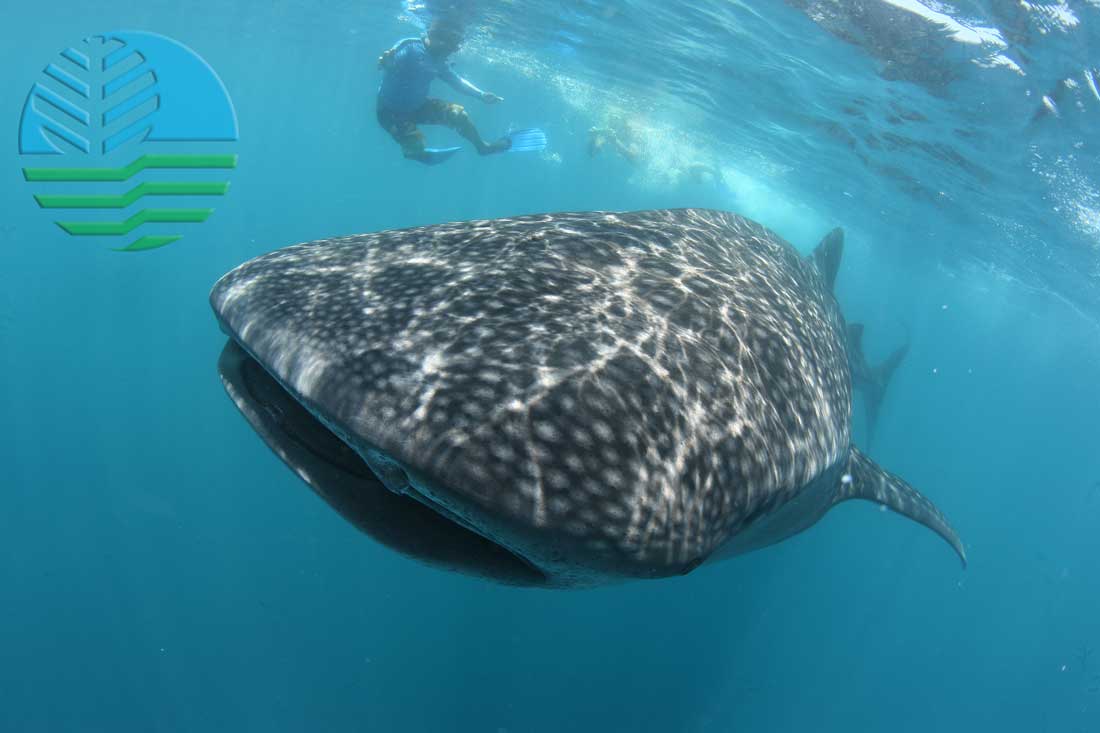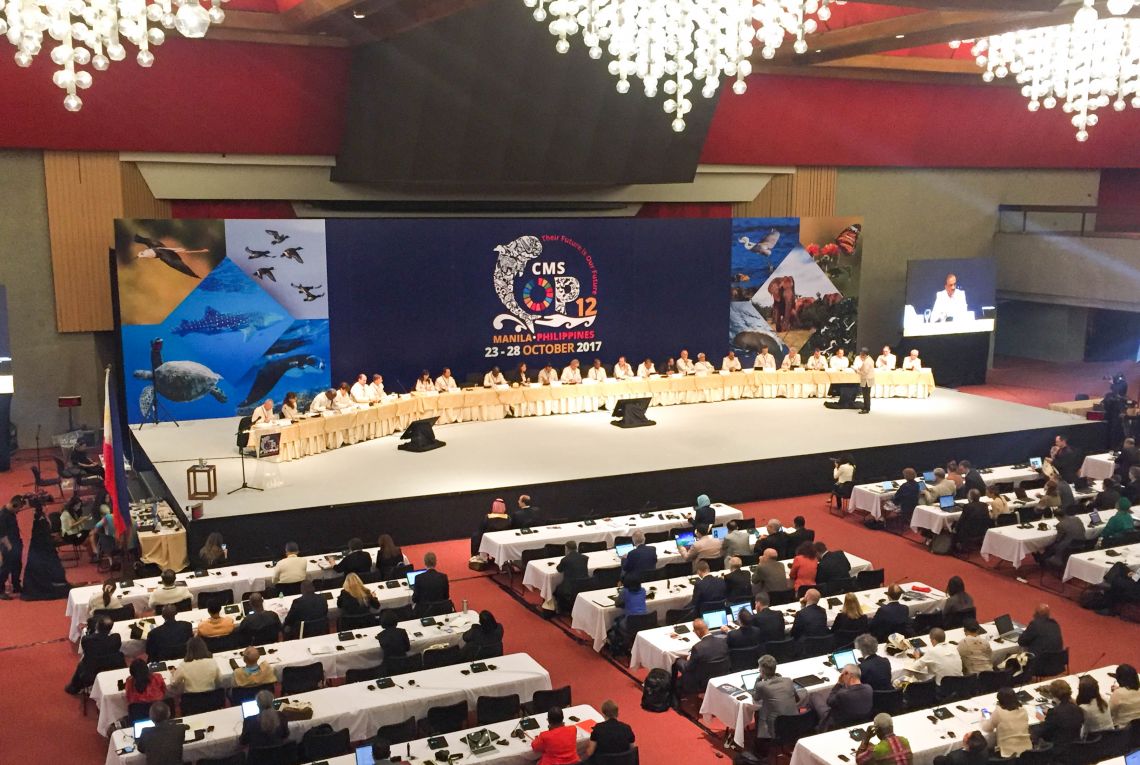The onset of November signals whale shark season along the string of fishing villages in the quiet town of Donsol, Sorsogon, south of Manila. For a fee, thousands of tourists get a glimpse of what is locally known as the “butanding” or even swim with these enormous yet extremely gentle giants.
Yet, human-whale shark interaction may soon come to an end as the world’s largest living fish is threatened with extinction.
In 2016, whale sharks were classified as “endangered” by the International Union for Conservation of Nature as they continue to be fished and killed in countries like China and Oman.

The whale shark, locally known as “butanding,” is a popular ecotourism attraction in Philippine coastal communities. It is currently sliding down to extinction. Photo from the CMS COP 12 website.
The Philippines, situated within the whale shark’s migration route, has decided to take a different tack. The Department of Environment and Natural Resources (DENR) is batting for greater protection for whale sharks and four other migratory birds and fishes, through measures seeking to guard them against unsustainable tourism practices, among others.
It hopes these measures will be included in the Manila Declaration on the Sustainable Development and Migratory Species, the expected outcome of the 12th Conference of Parties to the Convention of Migratory Species of Wild Animals (CMS COP12) hosted by the country from Oct. 22 to 28.
The CMS, also known as the Bonn Convention, is a treaty among countries around the globe to conserve wild animal species that transcend land, sea, or air in different territories. It was signed in 1979 and came into force in 1983.
Every three years, the Bonn Convention discusses among members the need to adopt strict protection measures for migratory species on the brink of extinction.
A total of 124 countries are party to the CMS, with the Philippines the only one in Southeast Asia.

Over 1,000 environment ministers and advocates worldwide gather in Manila on Oct. 22 to 28 for the 12th Conference of Parties to the Convention of Migratory Species of Wild Animals (CMS COP12). Photo by Maria Feona Imperial.
Environment Secretary Roy Cimatu, in a speech during a panel discussion among environment ministers Oct. 22, stressed the “indispensable contributions” of wildlife to sustainable development.
These include food, pollination, pest control, medicinal resources and eco-tourism, he said.
“Recognizing the great intent of activities involving wild animals and a multitude of benefits that humanity derives from them, it is our duty to reciprocate by harmoniously co-existing with all other creatures amidst our continuing pursuit of social and economic progress,” Cimatu said.
Currently, the whale shark is listed under Appendix II of the CMS. These are species that may not be endangered, but would still benefit from protection across their range, whether within a region or globally.
The DENR is moving to uplist the whale shark to Appendix I, the highest protection accorded to species threatened with extinction.
Under the Convention, countries that are within regular routes of species listed under Appendix I are obliged to offer immediate protection to these species by conserving their habitats.
They are required to prevent and reduce factors that may endanger the species. Such protection entails preventing, removing, minimizing and compensating for the adverse effects of activities that impede the migration of these animals.
More, the countries are required to reduce factors that endanger the species, such as strictly controlling or eliminating already introduced exotic species.
In the case of the whale shark, Cimatu, in an earlier statement, said the DENR’s position is to have a global ban on whale shark hunting.
The DENR has also proposed including in Appendix I the Christmas frigatebird, a large, mostly black seabird with a glossy green sheen which regularly visits the Tubbataha Reef in Palawan.
It is also pushing for an Appendix II status for the yellow bunting, the black noddy and the white-spotted wedgefish, none of which are in the CMS list of migratory species.
The draft Manila declaration aims to promote interlinkages between sustainable development and wildlife conservation with special focus on the 17 Sustainable Development Goals adopted by the United Nations General Assembly in 2015.
Dr. David Pritchard, an environment consultant for the CMS, cited examples of these interlinkages, including the SDG on ending hunger.
Birds, bats and bees affect a third of the world’s overall crop production largely through biological pest control, he said.
For instance, some birds and bats feed on insects, while birds of prey feed on rodents and other small mammals, reducing the need for farmers to spend on pesticides, Pritchard explained.
Likewise, the food security of some societies is based on the harvesting of migratory fish. Top predators in the marine ecosystem include sharks, which are crucial in maintaining ecological balance.
Beyond being “keystones for the functioning of ecological systems,” migratory species are symbols of cultural identity, social traditions and creative inspiration, according to Pritchard.
Lamenting a “deficit in political will,” Cristiana Pasca Palmer, executive secretary of the Convention on Biological Diversity, urged CMS signatories to be more politically visible when enforcing biodiversity laws.
She said she once did a survey on how well people know about biodiversity, only to be surprised by an answer that mistook the term for a detergent brand.
“Some countries are much more ambitious and committed in their implementation of actions, others perhaps less so,” she said.
“And that less so comes from political will because often … the knowledge or the understanding of the importance of biodiversity is not there,” Palmer added.
As the only Southeast Asian nation party to the CMS, the Philippines is expected to encourage neighboring countries to accede to the convention, especially since migration routes transcend borders, the DENR earlier said.
Dr. Theresa Mundita Lim, director of the DENR Biodiversity Management Bureau, said just by holding the conference in the Philippines, the first time in Asia, already brings the agenda closer to the ASEAN (Association of Southeast Asian Nations).
“Hopefully, because of this, it would bring greater attention and cooperation to protect shared species among ASEAN-member countries,” Lim said.
